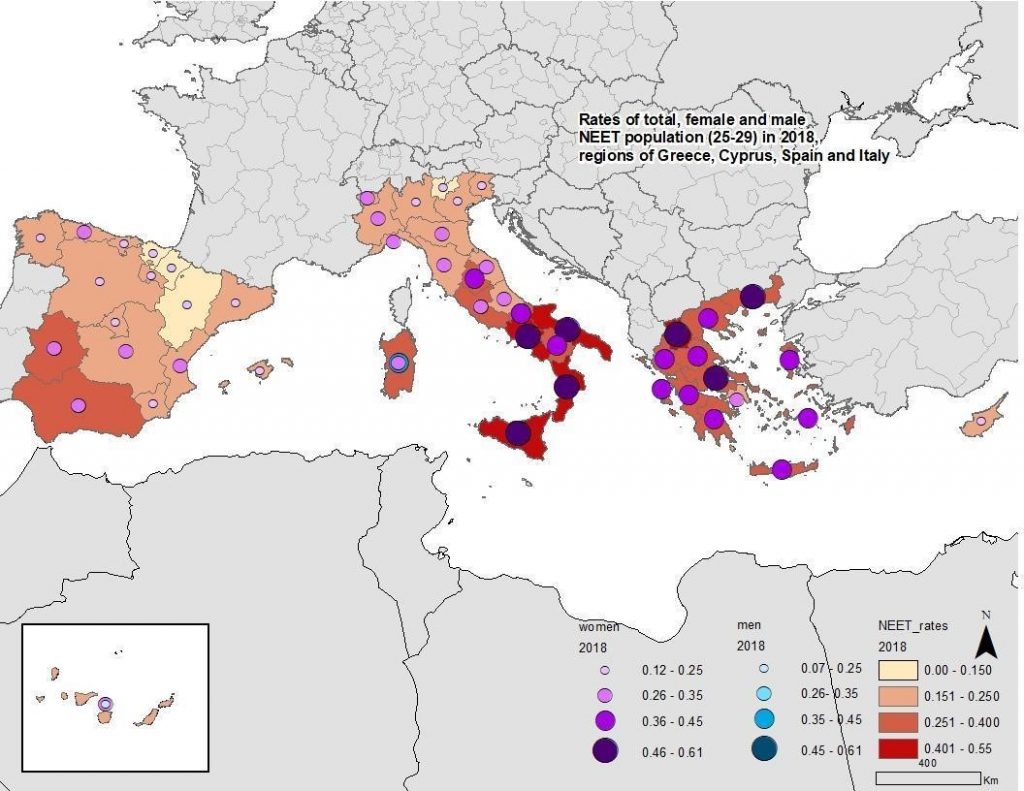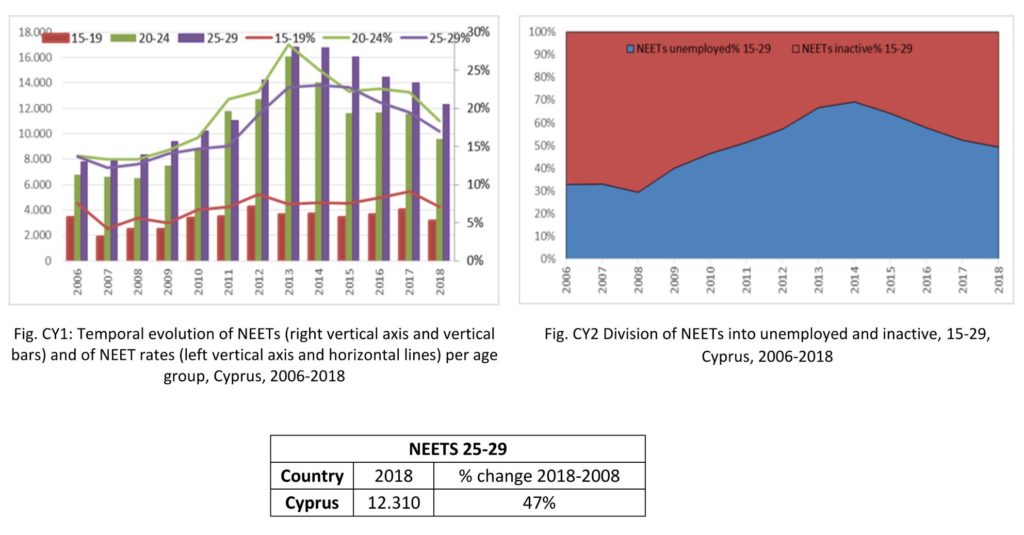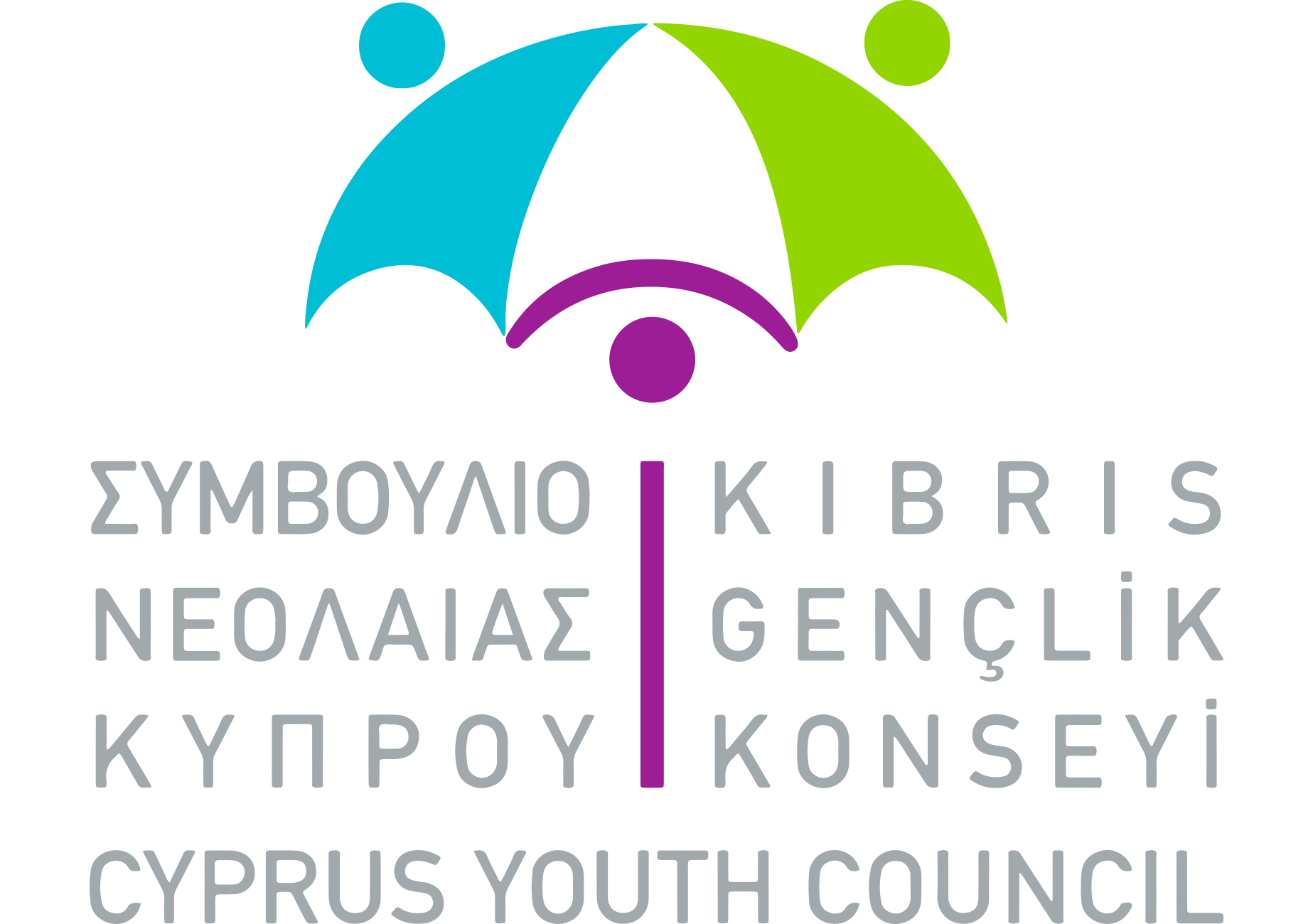
The researchers of the YOUTHShare project have recently delivered a baseline study regarding the development of the ΝΕΕΤs phenomenon (young people that are Not In Employment, Education or Training) in Greece, Cyprus, Italy and Spain as well as the policy responses between 2008 and 2018.
Authors*: Effie EMMANOUIL, Doctoral Researcher; Dr Michalis POULIMAS, Post-doctoral Researcher; Dr Ioannis PAPAGEORGIOU, Researcher; Dr Stelios GIALIS, Ass. Professor & YOUTHShare Principal Investigator, University of the Aegean
The YOUTHShare project aims at reducing youth unemployment in coastal and island regions of Mediterranean EEA by advancing the engagement and the skills of young people that are Not in Employment, Education or Training (hereafter NEETs) in trans-locally resilient economies such as agri-food production and pertinent circular economies.
By boosting NEETs potential in social entrepreneurship and sharing economy practices in those fields the project aspires to produce innovative, path-breaking, yet replicable, ideas on how to reduce economic disparities and increase social integration. The YOUTHShare project focuses on two usually neglected target groups: NEET women and NEET migrants aged 25-29. The target areas are also ‘divergent’: we focus on the sub-national scale and specifically on the less privileged regions (e.g. the coastal or island regions) of Greece, Cyprus, Spain and Italy.
The NEET rate is defined as “the share of young people NEET divided by the total number of young people in the specific age group, by gender” (OECD 2018, Eurostat 2019) and it concerns persons who face the following two conditions (Eurostat 2019): -“they are not employed” (i.e. they are unemployed or inactive according to standard definitions) or -“they have not received any formal or non-formal education of training in the four weeks preceding the survey”
Below, as a summary of the statistical data gathered and the analysis conducted so far, we present the change of the volumes and rates of NEETs within a relatively large period, namely between 2006 and 2018, across the crisis-hit regions of the Mediterranean EU. The data used for this analysis are mostly retrieved from Eurostat’s Labour Force Survey series as well as from national reports regarding the implementation of the Youth Guarantee (YG) initiative, the latter being the most important contemporary policy response against the NEET phenomenon. In several cases we have claimed and analyzed microdata for the respective years. The raw statistical data used, and the figures or maps designed can be, upon request, provided to the FO in order to facilitate the baseline study in progress. Those presented below belong to a sample of our work so far. Our main results, to date, reveal that the NEET population: i) is persistent and high in all study countries, ii) it is higher in specific regions than in others, iii) it has significantly, though unevenly, increased during the recent crisis, iv) it is decreasing in the post-crisis period, approaching its pre-crisis volumes only in some countries, v) is unevenly divided between different age groups, among which the 25-29 is the bigger one, vi) finally, it includes many more women and migrants than men and natives, in general.
* Acknowledgement: The authors would like to acknowledge the valuable contribution of the research staff of the YOUTHShare partners, Neapolis University Pafos (Cyprus), Sistema Turismo (Italy), Universidad Catolica San Antonio de Murcia (Spain), for the collection of the data used in the present study.
A statistical snapshot of young NEETs in Cyprus: The paradox of a gender gap reversal
The NEET population in the Cypriot social formation mainly follows a stable pattern of development for the age group of 15-19. On the contrary, the development for the age groups of 20-24 and 25-29 presents some fluctuations. Their population increases during the crisis (from 2006 to 2013) and then it falls (from 2013 up to to 2018). The maximum NEET rate is observed in 2013 (approx. 28% and 23% for 20-24 and 25-29, respectively) which underlies that the relatively older NEETs are the most affected ones.
Our analysis shows that in the post- crisis period, both the male and female NEET rates increased. Female NEETs, however, are currrenty slightly higher than male ones, especially in the 25-29 age group, even though males had higher rates between 2012 and 2014. A possible explanation for this ‘gender gap reversal’ paradox can be found in the higher job losses faced by women amid the turbulent years of the crisis.
Furthermore, available national data across all age groups (note that no regional data are analyzed for Cyprus since the whole country is a NUTS-II level region) demonstrate that the rise in NEET rates during the crisis is primarily driven by a high increase of the relative share of unemployed NEETs, while the relative share of inactive NEETs declines. This finding suggests that inactive NEETs and unemployed NEETs should be commonly treated as two separate groups that call for distinct and specialized policy interventions.
Considering all the above, our main conclusions for youth in Cyprus are the following: i) NEETs of the 20-24 and 25-29 age groups are strongly affected by the economic crisis in the country, ii) female NEETs face higher barriers when trying to find a job or entering any form of education, and iii) the relative share of unemployed NEETs within the total NEET population is increasing at a high pace, whereas the relative share of inactive NEETs is decreasing.

NEETS 25-29 Country 2018 % change 2018-2008
Cyprus 12.310 47%
Policy responses in Cyprus
General Note on Policy Responses In order to confront the issues related to youth unemployment, early school leavers, labour mismatches resulting from inadequate skills, limited geographic mobility or inadequate wage conditions etc, the European Union supports its member states in achieving the goals of enhanced youth employability presented in the EU2020 strategy (European Commission, 2010). A salient key action of the latter strategy is the “Youth Guarantee” (hereafter YG) programme. All EU countries have committed to the implementation of the Youth Guarantee in the Council Recommendation of April 2013 in Luxembourg. The established “Youth Guarantee” is considered to be the most significant effort for assisting young people either to re – enter the labour market or to acquire education or training (Eurofound 2016). As the YG stongly suggests, all member states should ” ensure that all young people under the age of 25 years receive a good- quality offer of employment, continued education, an apprenticeship or a traineeship within a period of four months of becoming unemployed or leaving formal education” (Council Recommendation of 22 April 2013:3).
Cyprus presented its Youth Guarantee Implementation Plan at the end of December 2013 and a National Action Plan (NAP) for youth was approved one year later. Government policies and institutions play an important role in moderating the impact of the economic recession and in facilitating the transition of young people to the labour market and education. The policy areas that have an impact on youth employment are the (a) macroeconomic and sectoral policies and their impact on job creation, (b) the education and training policies and their relevance to labour market requirements and (c) the labour market policies that bridge labour supply and demand gaps. (National Action plan for Youth employment in Cyprus, 2014-2017, 2014).
In 2016, only a discouraging 6.3% of the people exiting the YG are known to have undertaken an offer within 4 months of registration, even though this precentage is perhaps not properly estimated. During the same year the Cypriot YG scheme covered 23.8% of all NEETs aged under 25 years old. Only 14.1% of the people who left the YG in 2016 were known to be in a positive situation (employment or traineeships) 6 months after leaving, even though this percentage is again not a safe estimation, since 84.0% of the people who left the YG could not be tracked and included in the analysis. Finally, 46.3% of the people registered in the YG scheme during 2015 had been waiting for an offer for more than 4 months, which is a significant increase compared to previous years (23.3% in 2014 and 33.7% in 2015), probably caused by the recession that hit the country (Youth Guarantee of Cyprus 2018).
Find the full report here.
